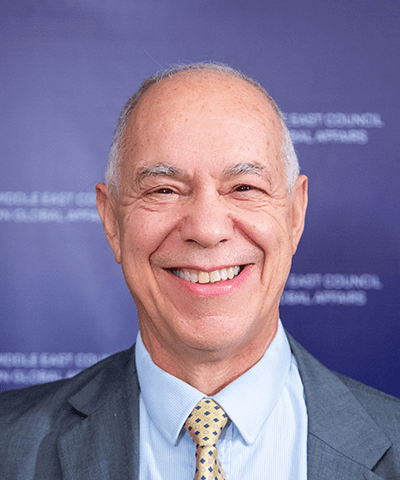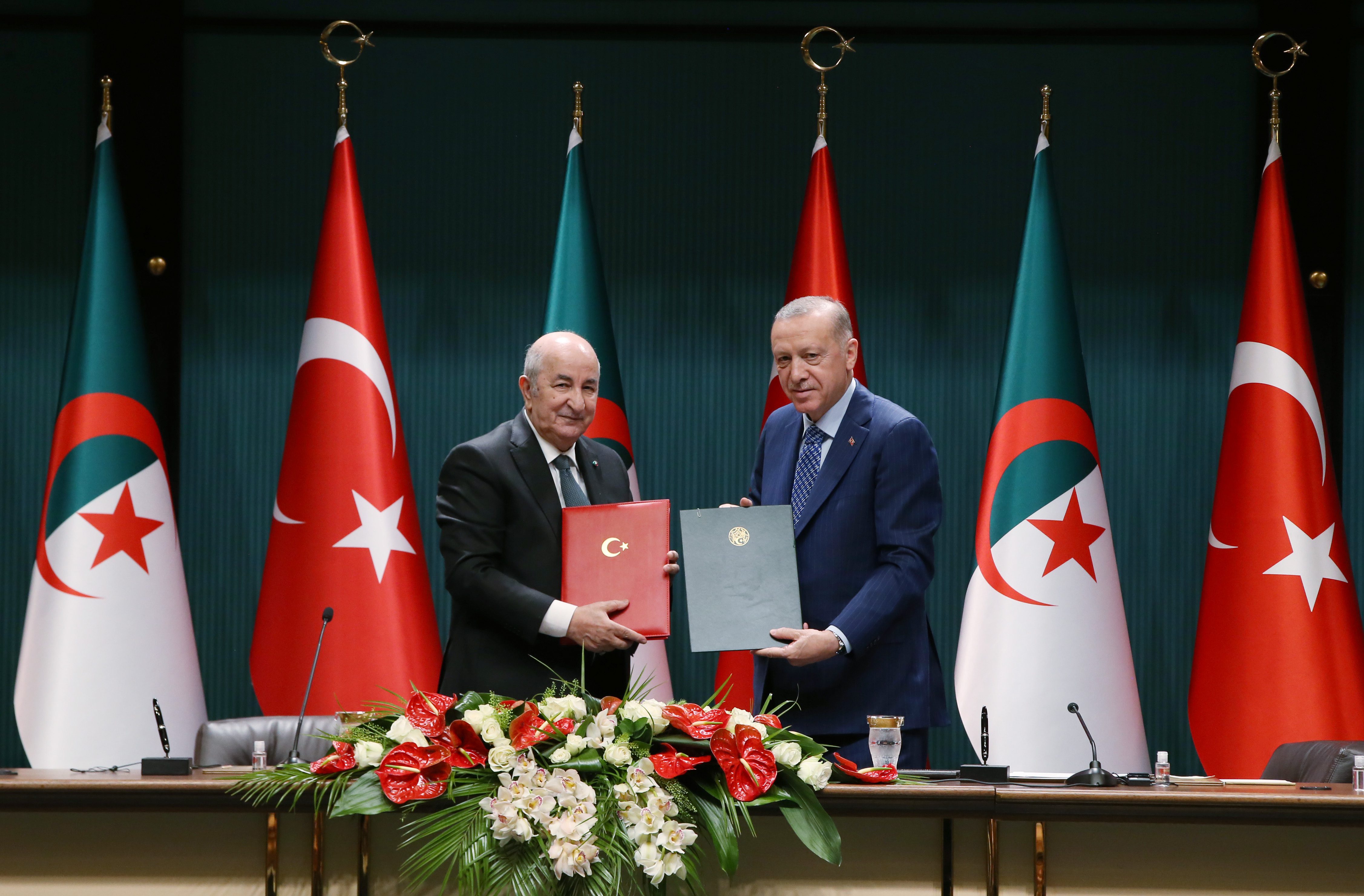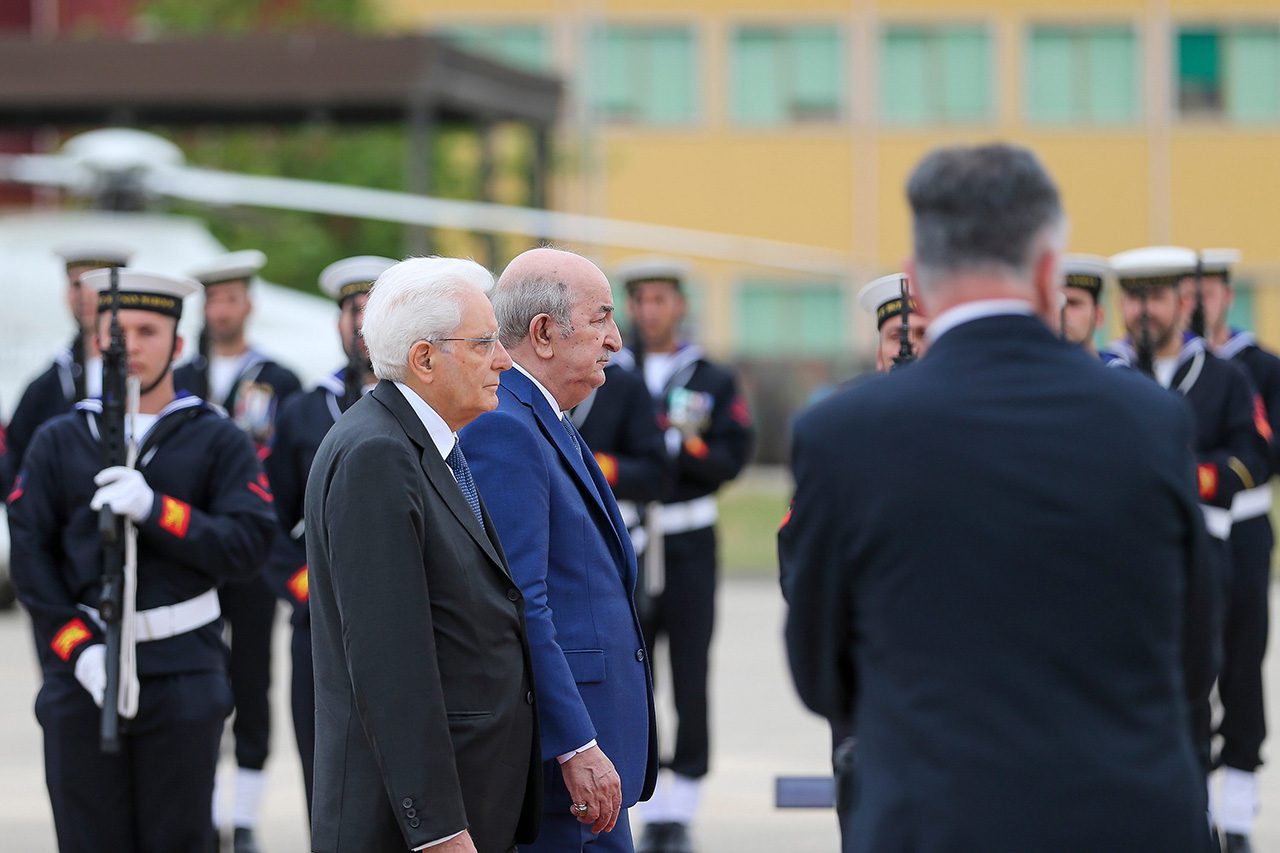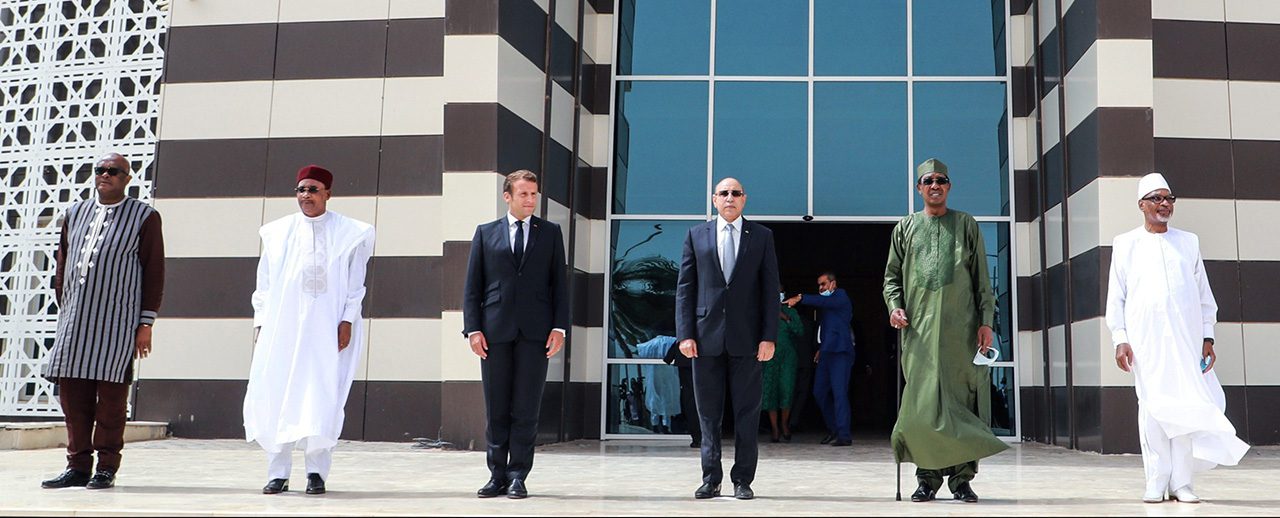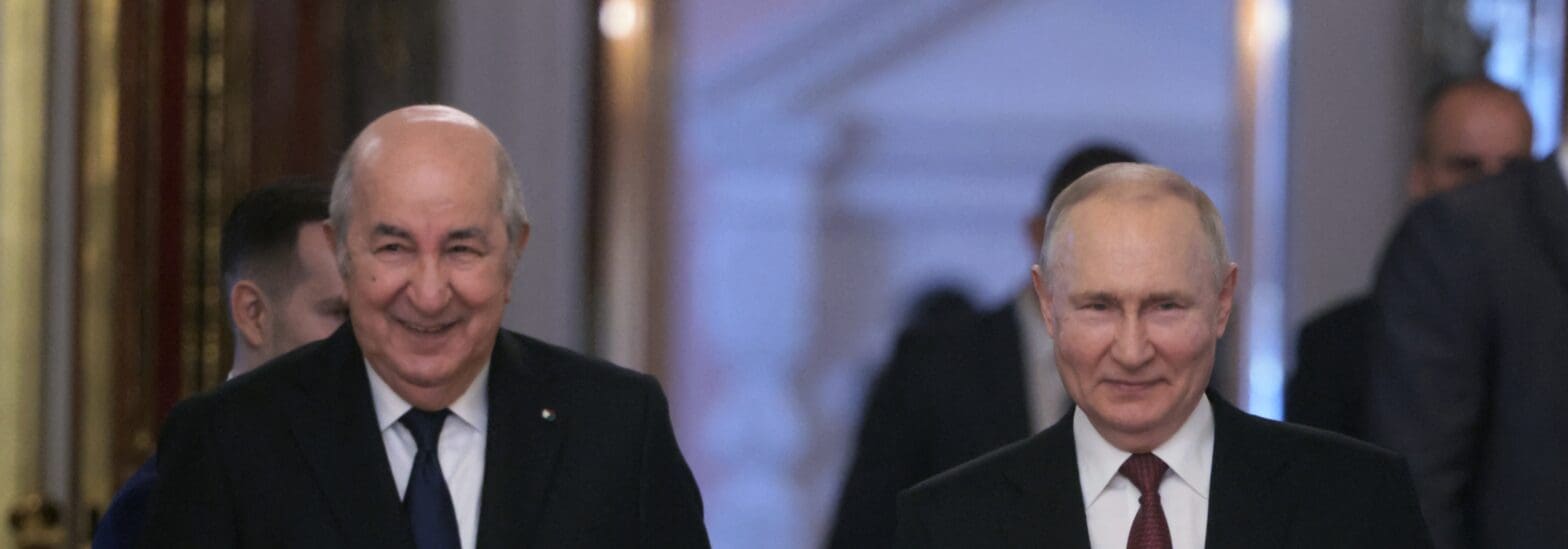
Algeria-Russia Ties:
Beyond Military Cooperation?
Issue Brief, January 2024
Key Takeaways
Enduring Ties: Over decades, Algeria has maintained excellent relations with Russia. The Soviet Union, Russia’s predecessor, supported the North African country’s struggle for independence from France and helped build the post-colonial Algerian state and its military.
Western Opposition: Western officials have criticized Algeria for its relations with Russia, particularly over arms purchases. This overlooks history, the fact that Morocco, Algeria’s rival, procures extensive weapons from the West, Algeria’s strong relations with other world powers, and its traditional policy of nonalignment.
Growing and Diversifying Relations: Despite Russia’s isolation, following its ongoing war in Ukraine, since 2022, Algiers and Moscow are strengthening and diversifying ties. Their 2023 Enhanced Strategic Partnership envisions cooperation in new areas like agriculture and trade.
Limits to Algerian-Russian Cooperation: While they both share robust defense ties and similar stances on various international issues, both countries’ relations are limited by Algeria’s tradition of nonalignment, its ties with other major powers, and diverging views on regional issues.
Introduction
In June 2023, President Abdelmadjid Tebboune made a high-profile trip to Russia, where he received a warm welcome from President Vladimir Putin.1 His visit came despite strong criticism from Europe and the United States2, whose Secretary of State Antony Blinken had urged Algeria a year earlier to limit its ties with Russia following the war in Ukraine.3 The visit highlighted both the importance of Algeria-Russia relations and Algeria’s long-standing insistence on conducting an independent foreign policy. This, in part, explains why Tebboune did not cancel his trip despite the threat of sanctions, and why he offered to mediate between Russia and Ukraine, an offer Putin welcomed, voicing gratitude for Algeria’s support.4
Just under a year earlier, on September 15, 2022, the Vice Chairman of the U.S. Senate’s Select Committee on Intelligence, Marco Rubio, called on Blinken to impose sanctions on Algeria for purchasing weapons worth $7 billion5 from Russia in 2021.6 Two weeks later, U.S. Congresswoman Lisa McClain and 26 of her colleagues also sent Blinken a letter calling for sanctions on the country under the Countering America’s Adversaries Through Sanctions Act (CAATSA).7
European officials soon followed suit. In a letter dated November 17, 2022, 17 Members of the European Parliament urged European Commission chief Ursula von der Leyen to re-examine the bloc’s 2005 Association Agreement with Algeria, voicing “deep concern” at Algeria’s “close political and economic ties to Russia.”8 These letters, and numerous articles to the same effect, were both ideologically motivated9 and came short of understanding Algeria’s foreign policy orientation in general10 and its ties with Russia in particular.11
Despite its warmth, this relationship rests on pragmatism. Algerian authorities have consistently pursued a foreign policy based on nonalignment, even before the country’s independence in 1962.12 This remains the case today.13 In light of this reality, this paper argues that the Algerian-Russian relationship, born out of Algeria’s anticolonial war, is likely to endure despite concerns and pressure from the West. From Algeria’s perspective, relations with Russia, particularly in the military sphere, are vital for its own national defense and security.
Historical Context
Algeria’s modern relations with Moscow date back to Emir Abdelkader,14 a leading figure in Algeria’s fight against colonialism, who made contact with Russia during his exile in Syria in the 19th century.15 Algerians developed connections with the Soviet Union during the Algerian war of independence (1954-62). The National Liberation Front (FLN), in particular, maintained good relations with the Soviets throughout the 1950s. The Soviet Union supplied aid to the FLN and its National Liberation Army (ALN), as it fought against French rule. In 1960, Moscow extended de facto recognition to the Provisional Government of the Algerian Republic, proclaimed two years earlier.16
Following Algeria’s independence in 1962, establishing ties with the Soviet Union was a natural step, especially given U.S. backing for Morocco in the “Sand War” during the fall of 1963.17 That same year, the United States and France declined to sell Algeria military equipment that was urgently needed by the National Popular Army (ANP),18 the successor of the ALN.
Mutual distrust complicated Algeria’s ties with both the United States and France prompting Algiers to enter a closer, albeit cautious, political, military, energy, and to a lesser degree, economic relationship with Moscow. For Algerian policymakers, the main security threats emanated from NATO powers,19 which supported colonial France against Algerian nationalists, and Morocco, which is equipped with Western – mainly American – military hardware. This perception persisted, shaping Algeria’s arms purchases which were determined by historical and geopolitical considerations and by the competitive prices of Soviet and Russian weapons.
Soviet military expertise also contributed to the transformation of the Algerian military from a guerrilla force into a modern army.20 Thus, Algerian-Russian relations today cannot be understood without grasping their history. For Algeria, ties with Russia are part of a traditional policy of nonalignment and an autonomous foreign policy centered around national interests. Ironically, Algeria’s policy of nonalignment also limits the extent of Algerian-Russian cooperation. Thus, as Foreign Minister Ahmed Attaf said during a visit to Washington, D.C. in August 2023, “relations with Russia are not exclusive of all the relations of quality [and] of friendship with other countries.”21 Algeria has even sought to maintain good relations with Ukraine throughout the Russia-Ukraine conflict.
For Moscow, reviving and consolidating traditional relations with Algeria is part of a broader strategy of reasserting Russia’s status on the world stage by expanding its political, trade, security, and cultural interests across Africa, which has become a salient arena for Russian foreign policy. Algeria is of particular importance, as the largest country in both Africa and the Arab world, a major Mediterranean country, and a heavyweight in the African Union, a member of the Arab League, and the Non-Aligned Movement.
Revival of Ties
Algeria’s relations with Russia revived after both countries underwent major domestic challenges and periods of transition in the 1990s.22 Algeria suffered years of violent civil strife and the economic turmoil of an IMF structural adjustment program, while Russia experienced the end of the Soviet Union and the abolition of the ruling Communist Party, failed coups in 1991 and 1993, and major economic changes.
Upon his ascent to power, Putin sought to revamp Russia’s political and military relations. This coincided with a drive by Algeria to regain the role it once played on the global stage.23 Renewing ties with Algeria helped Moscow re-establish a presence in the Maghreb, increase its foothold in the Mediterranean, gain an economic and political presence in Africa, and define its ties with Algeria’s neighbors.24
In 2001, Algeria and Russia signed a “Strategic Partnership Agreement,” making Algeria among the first to sign this deal with Russia. The agreement aimed to strengthen political, economic, and military ties. Although both countries disagree on some issues (notably Libya and the Wagner group’s presence in the Sahel), they have often shared similar positions on issues such as Western hegemony, the Arab-Israeli conflict, and the Iraq war.25
As part of its efforts to re-establish itself as a superpower, Moscow expanded its involvement in the energy sector beyond its borders, forging closer ties with several oil and gas exporters,26 including Algeria. Prior to the ongoing Russia-Ukraine war, energy exports were a critical means for Russia to exert pressure on Europe, considering Europe’s reliance on Russian energy.
However, at the heart of the Strategic Partnership between Algeria and Russia is the supply of military equipment and expertise. Despite diversifying their military supplies, the Algerian Armed Forces purchased 73% of their weapons from Russia between 2018 and 2022 (Figure 1).27 Between 2000 and 2016, Algeria accounted for over half of Russian arms exports to the MENA.28 Algeria’s purchase of $4.2 billion-worth of Russian arms, in 2016-2020, represented 14.9% of Russian arms sales, making Algeria Russia’s third arms customer after India (23.3%) and China (18.2%).29 Naturally, the extent of this reliance necessitates good relations with Moscow, whose military personnel also repair aging equipment and train Algerian forces on the use of high-tech armaments.
Figure 1. Algerian Arms Procurement
Source: The Stockholm International Peace Research Institute (SIPRI)’s Arms Transfers Database, generated on 8 October 2023. Note: The SIPRI trend-indicator value (TIV) is a measure of the volume of international transfers of major arms. The TIV methodology is described on SIPRI’s website at https://www.sipri.org/databases/armstransfers/sources-and-methods.
Purchasing defense supplies from Russia offers Algeria several advantages, allowing it to obtain modern weapons at a lower cost than those from Western countries and without conditions attached. Algeria has thus acquired advanced weapons such as Su-57 stealth fighters, becoming the first foreign buyer of this flagship of Russian combat aviation.30 It is still not publicly known whether Algeria possesses the valued S-400 mobile surface-to-air missile system.31 These weapons and systems are sometimes used in Algeria prior to being used in Russia.32 From 2021 onwards, Russia increased its furnishing or commitments to supply high-tech military equipment to the ANP, some of which were displayed during maneuvers south of Algiers in June 2023.33
Although Algeria has purchased billions in arms and military technology, it failed to secure local manufacturing authorizations or technology transfers from Russia, despite other suppliers like Germany, China, and Italy doing so.34 The reasons for this are unclear. However, during Tebboune’s state visit to Russia in June 2023, Putin declared that “Russia is ready not only to supply equipment and organize its after-sales maintenance but also to localize production in Algeria,”35 signaling Russia’s potential willingness to transfer its technology to Algeria.
Algeria and Russia have also held several joint military exercises in recent years. The first took place in 2021, in North Ossetia, in southwest Russia. Eighty Algerian troops practiced searching and eliminating illegal armed groups and carrying out radiation, chemical, and biological reconnaissance.36 The exchange of counter-terror experience was a key motivation for conducting this exercise, especially as the challenge of securing commercial, gas, and oil transportation routes is critical for both Russia and Algeria.37
In November 2021, the Russian and Algerian militaries also participated in naval exercises in the Mediterranean. Under “Joint Naval Exercise-2021,” a detachment of vessels from Russia’s Black Sea Fleet, consisting of the frigate “Admiral Grigorovich,” patrol boat “Dmitri Rogachev,” and lifeboat “SB-742” sailed to Algiers to take part in the exercise along with Algerian navy vessels.38
The exercise took place just two weeks after the arrival of two American warships in the Black Sea, the Mount Whitney command ship and USS Porter, a missile destroyer.39 According to defense expert Abdelkader Soufi, the Algerian-Russian maneuver was potentially “a response to the provocation of the American-Atlantic alliance, which has long considered the Mediterranean to be its preserve.”40 Algeria’s Ministry of Defense, however stressed that the joint exercise was part of routine Algerian-Russian military cooperation and exchanging expertise.41
In September 2022, Algeria participated in Command and General Staff strategic military exercises, “Vostok-2022,” in the far east of Russia.42 It was rather new for the Algerian army to be involved in such an extensive drill in Russia, particularly since it concentrated on command and had a strategic aspect.43 The 100-member Algerian combat unit took part in the exercise alongside 50,000 other forces.44 One scenario was the simulation of “a large-scale maritime attack and the response to an attempted invasion by a large fleet by an international coalition.”45 Partaking in the exercise was logical for the ANP, given that Algeria has more than 1,200 kilometers of coast along the Mediterranean. The Algerian navy’s participation in exercises with the United States46 and NATO47 naval forces is also noteworthy.
In April 2022, the Russian Ministry of Defense announced that a joint anti-terror exercise, “Desert Shield,” would take place from November 16-28 in southwestern Algeria.48 The European Union and 17 members of the European Parliament expressed “deep concern” about the exercise,49 but the Algerian Ministry of Defense declared that it had not taken place, and noted that “joint exercises with the Russian army or any other partner are announced via official press releases.”50 The incident highlighted Europe’s worries about Algeria’s close military cooperation with Russia.
Despite these concerns and Europe’s support for Ukraine, Algeria, and Russia’s military cooperation will likely continue due to several factors. Firstly, Algeria’s military cooperation with Russia is decades old and serves its national interests, particularly its national security, which explains increased purchases of advanced Russian weapons and joint military exercises. Algeria must defend seven borders, most of which it shares with unstable countries such as Libya, Mali,51 and Niger, which in July 2023 became the latest in a string of Sahel countries to witness a coup d’état. Algerian national security officials express particular concern over Morocco,52 a major military rival, whose weapons are primarily supplied by the United States and France.53 In October 2020, Morocco and the United States signed a 10-year military cooperation agreement.54 Algerians worry that the strengthening of U.S. military cooperation with Morocco could undermine Algeria’s role in the region.
Secondly, due to its history, Algeria is politically closer to states such as Russia and China that counter Western hegemony.55 And thirdly, in December 2020, as part of the Abraham Accords, the United States brokered a normalization deal between Morocco and Israel.56 For Algeria, Moroccan-Israeli normalization in itself did not represent a threat, but Trump’s recognition of Morocco’s sovereignty over the Western Sahara,57 which the Biden Administration has not rescinded, worried Algerians considerably. The Western Sahara has long served as a critical source of tension between Algiers and Rabat where Algeria backs the Polisario Front. However, Algeria’s real concern emanates from Israeli-Moroccan military and security relations,58 which include major sales of arms,59 some of which have been used against Polisario fighters.60 Israel’s establishment of a military base in Morocco, near the Algerian border,61 compounded fears in Algiers and allegations surrounding Morocco’s use of Israeli developed spyware “Pegasus” to target more than 6,000 Algerians, including senior political and military officials purportedly contributed to Algeria’s decision to sever diplomatic relations with Morocco in August 2021.62
These factors, primarily, pushed Algeria to increase its military cooperation with Russia. Despite the strength of military relations, Algeria has maintained its objection to Russia’s requests to use the naval base of Mers-el-Kébir, near the western end of Algeria’s coastline,63 granting access to the base would be tantamount to breaking with Algiers’ longstanding nonalignment policy.64 Algeria’s military cooperation with Russia thus serves as a counterweight to Morocco’s alliance with the West, while stopping short of placing Algeria firmly in any anti-Western bloc. Its neutrality in the Russia-Ukraine conflict65 can therefore be understood as part of efforts to revive the Cold War-era Non-Aligned Movement66 and its wish to maintain independence in its foreign policy.
Drivers of Algeria’s Neutrality in Ukraine
Algeria and Ukraine shared excellent relations for decades. Algeria was among the first states in the MENA to recognize Ukraine’s independence, in late 1991.67 In 2020, Algeria and Ukraine expressed interest in setting up a joint commission to strengthen bilateral relations.68 However, a diplomatic dispute broke out, in March of 2022, a month after the start of the Russia-Ukraine war. The Ukrainian Embassy in Algiers published a call for volunteers69 to enlist to fight the Russian army. Algeria demanded that it immediately withdraw the call from its website,70 and the embassy complied.71 Meanwhile, in Ukraine, an Algerian aeronautics student died during the fighting in Kharkiv; subsequently, Algeria announced that same month that it would “temporarily close” its embassy in Kiev.72 The embassy reopened in February 2023.73
While Algeria has been accused, on several occasions, of siding with Russia in the conflict, the reality is more complex. Algeria has implicitly condemned Russia’s intervention, arguing that nations’ sovereignty and territorial integrity should be respected. It has, however, maintained that the “legitimate security concerns of the parties concerned should be accommodated,” and “oppose[d] the indiscriminate imposition of unilateral sanctions [that is to say, against Russia] that have no basis in international law.”74 Algeria also abstained from the vote on a UN General Assembly (UNGA) resolution calling for Russia’s suspension from the Human Rights Council in April 2022. 75
Algeria’s pragmatic position is motivated by its dependence on Russia for its national defense. In October 2022, it clung to its policy of nonalignment, abstaining on another UNGA vote condemning Russia’s infringements on Ukrainian territories.76 According to Algeria, the solution to the conflict requires “the application everywhere of the principles and purposes of the United Nations Charter.”77 Algeria’s nonalignment was also underpinned by its desire to play another role it values as a regional power: that of mediator.78
In early April 2022, Algeria led an Arab mission comprising the foreign ministers of Jordan, Sudan, Iraq, and Egypt as well as the Secretary-General of the Arab League, Ahmed Aboul Gheit, offering its good offices in resolving the conflict and meeting the Russian and Ukrainian Foreign Ministers in Moscow and Warsaw, respectively.79 Notably, it was the Algerian Foreign Minister, Ramtane Lamamra, not Aboul Gheit, who headed the mission.80 However, the Arab mission’s attempt to mediate failed.
The Ukraine War and Europe’s Gas Supply
The Russia-Ukraine war has challenged Algeria’s principles regarding sovereignty and nonintervention. However, Algiers continues to maintain close bilateral relations with Moscow, while reassuring its European partners of its own commitment to increase output of natural gas.81 Russia has not objected to Algeria positioning itself as an alternative gas supplier to Europe, viewing the issue as purely commercial.82 Moscow is also aware that Algeria alone cannot satisfy the European market, meeting only 10-12% of its demand between 2021 and 2022.83 However, the war strengthened Algeria’s position as a gas supplier to the EU,84 while Russia’s exports have dwindled, Algeria became Europe’s third largest gas supplier in October 2023.85
While Algeria and Russia have cooperated extensively in the hydrocarbons sector over the past two decades, they are also competitors when it comes to gas exports but Algeria has shown a desire to maintain its independence as an energy exporter.86 In 2007, for example, it was reluctant to collude with Russia to create a gas cartel.87 That said, Russia and Algeria have cooperated, through their respective state energy giants Gazprom and Sonatrach, on the exploration and extraction of hydrocarbons.88
In May 2022, Lavrov’s visit to Algiers culminated with the announcement of preparations for a new document that would replace the Declaration of Strategic Cooperation adopted in 2001, expanding and further strengthening relations beyond defense and towards developing political, economic, military, cultural, and scientific cooperation.89 Algeria feared a hostile response from its Western partners and was cautious to avoid potential U.S. sanctions over its arms purchases.90 However, its determination to expand relations with Russia prevailed, and was subsequently boosted by Putin re-extending an invitation to Tebboune to visit Russia91 and by Russia’s support for Algeria’s bid to join the BRICS.
Tebboune’s Visit Extends Ties Beyond Defense
When Tebboune visited Russia in June of 2023, Putin’s warm welcome underscored the importance of Algerian-Russian ties, which were further bolstered by their signing of a “Declaration on Enhanced Strategic Partnership.”92 The leaders reiterated their shared stances on regional and international issues; Putin asserted that “the views of our states are identical or similar on the majority of [issues],”93 akin to Algerian-Russian relations during the Soviet era.
Yet both states also diverge on some issues. Moscow’s policy in Libya, though complex, has been at odds with that of Algiers,94 which unlike Moscow has supported the UN-recognized Government of National Accord (GNA) in Tripoli. Algeria also opposed the presence of foreign forces in Libya, with which it shares a nearly 1,000-kilometer border and represents a credible threat to its security.95
Russia’s Wagner group is one of the major foreign forces in the country, and its presence in the Sahel more generally is another point of contention between Algiers and Moscow. Tebboune indirectly criticized Russia in 2022, telling French newspaper Le Figaro that “the money this presence [of Wagner] costs would be better spent and more useful if it went into development in the Sahel […], if it was invested in economic projects.”96 Although Putin likely discussed both countries’ long-standing military cooperation with President Tebboune, he emphasized during the joint press conference the development of economic and business ties. Algeria excluded military cooperation from the agenda during Tebboune’s trip to Moscow.97
Even before the West imposed sanctions against it, Moscow’s interest in greater economic cooperation derived from the need to diversify its economic ties. Algeria, one of the world’s top importers of wheat ($2.7 billion in 2022),98 heavily relies on Russian grains. While France used to be Algeria’s main supplier, Russia has now overtaken it. In 2022, Algeria virtually quadrupled its imports of Russian wheat.99
Russian-Algerian cooperation in the agricultural sector has also increased considerably, including sales of beef and dairy products.100 Algeria is currently working to expand economic cooperation with Russia, as it did with Turkey,101 China,102 and Italy,103 to other sectors as part of its efforts to reform its economy and attract investment. Tebboune called on Russian businesses to invest in Algeria. Growing Russian investment has flowed into sectors including energy, pharmaceuticals, transport, logistics and infrastructure. The volume of bilateral trade increased by almost 70% in 2022, according to the Russian Minister of Economic Development, Maxim Reshetnikov.104
Both Algeria and Russia are working to expand bilateral investment flows, aspiring to do so within the framework of BRICS, which Algeria has tried but failed to join.105 Tebboune participated in the St. Petersburg International Economic Forum as a guest of honor in June of 2023, inviting both public and private companies from Russia and elsewhere to invest in Algeria. He noted that his country has moved to incentivize foreign investment in various sectors, with a new investment law which ensures the state’s protection and cannot be modified for at least 10 years.106 Time will tell whether these moves towards diverse forms of cooperation will pay off. Currently, defense cooperation remains predominant.
Conclusion
Notwithstanding the risks of maintaining close relations with Russia, Algeria has not only sought to reinforce those ties but also to expand them into new areas. However, it has concurrently adhered to its long-standing policy of nonalignment and insisted on choosing its political and economic partners freely, including Russia’s rivals.
Algeria continues to maintain close ties with countries that supported its war of independence. Changes in the international system and pressures on Algeria do not alter the country’s longstanding friendship with Russia. Tebboune highlighted during his visit to Moscow that the consolidation of Algeria’s independence rested on Russia’s “strong [assistance], our armament and the defense of our freedom in very difficult regional circumstances”107 and although Tebboune has declared that “the BRICS file is definitively closed,”108 Putin has stressed the importance of Algeria’s eventual membership in the bloc.109 This declaration highlights the importance of Algeria to Moscow and as insecurity continues to plague its immediate neighborhood, Algeria will continue relying on Russia.
Given the similar stances both hold on the necessity of a multipolar order, combined with Moscow’s position on the Palestinian-Israeli conflict, and other issues, it is highly likely that these bilateral ties will continue to grow. The current Israeli war on Gaza, backed by most Western states, and the United States in particular, which supports Israel militarily and politically, has brought Russia’s position closer to Algeria’s. Although Russia maintains good relations with Israel, it also shares strong relations with the Palestinians, including close ties with Hamas.110
While the United States refused to call for a ceasefire in Gaza, Russia’s UN draft resolution called for an immediate and durable ceasefire but was vetoed by the United States.111 Previously, in February 2019, Moscow sought to unify the Palestinian factions into a single force.112 Similarly, in July 2022, Algiers brought together the Palestinian Authority’s Mahmoud Abbas and Hamas’ Ismail Haniyeh with the objective of reconciling the two groups.113
Algeria and Russia’s cooperation will likely not only strengthen on the bilateral level but also in multilateral settings, including at the UN Security Council, on which Algeria will serve its 2-year term as a non-veto-wielding member starting January 2024. They will also continue to cooperate within the OPEC+ grouping of energy exporters. The convergence of views on the Palestinian question, which occupies high importance in Algeria’s foreign policy,114 will also help strengthen the already robust Algerian-Russian ties.
Endnotes
